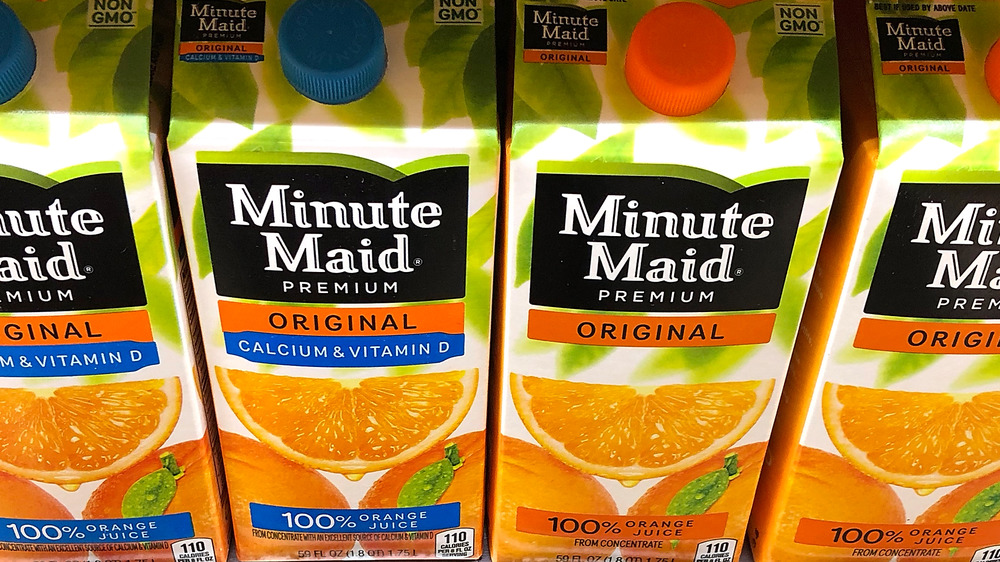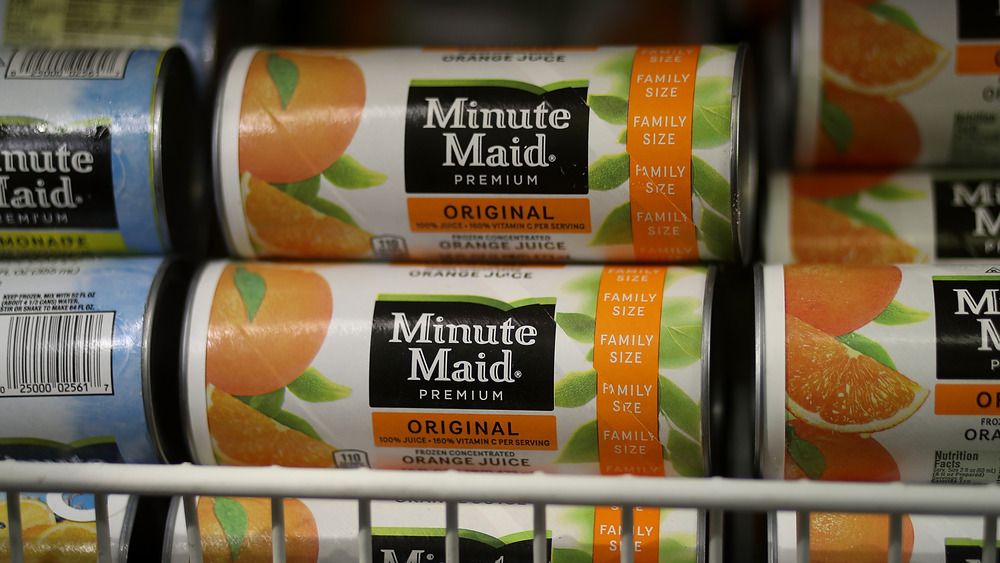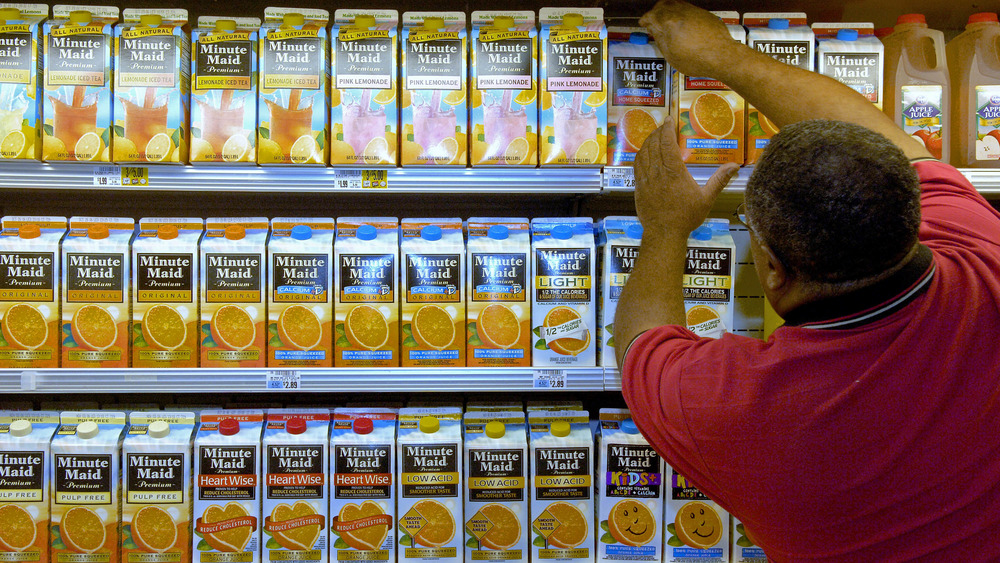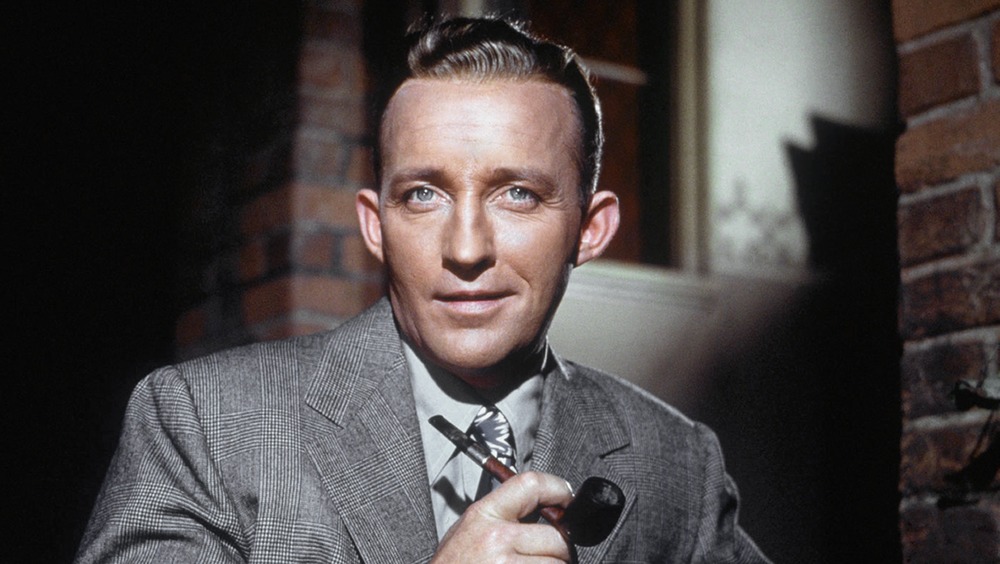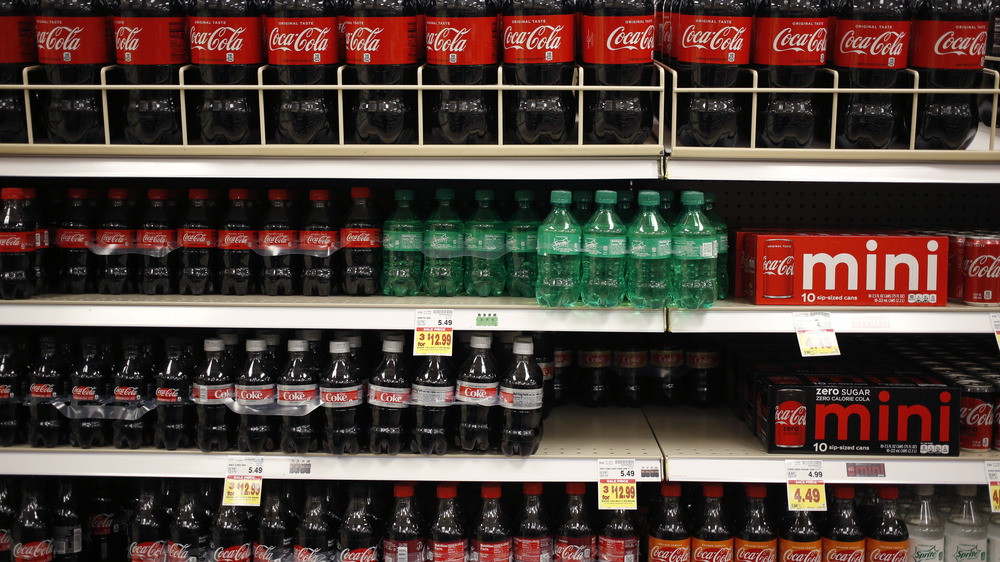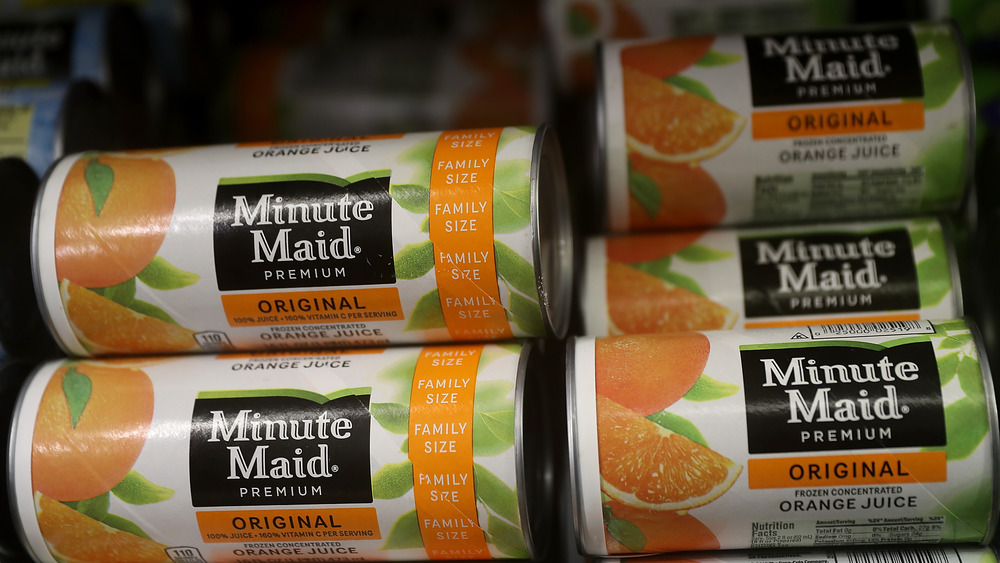The Untold Truth Of Minute Maid
The iconic brand Minute Maid, with the black label with white lettering, may be symbolic of many peoples' childhoods. Their frozen concentrate orange juice cans helped get this company its start, before it branched out into ready-to-drink juice. To this day, Minute Maid continues to sell this classic concentrate, along with other flavors, such as lemonade and raspberry lemonade.
According to the company website, Minute Maid has been around a lot longer than most people realize, beginning in the 1940s. During World War II, efforts to get medical supplies to soldiers faster, via dehydration, helped spur the concept of powdered orange juice (via Time Magazine). But before a powdered version reached the public, a better idea launched: frozen juice concentrate in cans. O.J. may be the quintessential breakfast juice, one that accompanies the morning kitchen table, whether it's the weekend or a weekday.
Minute Maid has a curious history — from launching after World War II, getting name brand recognition in the early 1950s thanks to the singer Bing Crosby, and a decade later, purchased by the soda giant Coca Cola. Today, Minute Maid is a recognized brand available both in the United States and sold throughout the world.
Frozen concentrate juice was inspired during World War II
According to Time Magazine, the National Research Corporation (NRC), based in Boston, Massachusetts, was creating dehydrated medical supplies for use during World War II. The U.S. Army decided to partner with them to create orange juice in a dehydrated form. The NCR created a new company, called Florida Foods Corporation, and soon after received a government contract to create powdered orange juice and open a plant in Florida (via FundingUniverse).
Before they could get everything up and running, however, the war ended and the contract was suspended (via FundingUniverse). But Florida Foods Corporation, headed by John M. Fox, was undeterred. Fox realized there was a business opportunity to sell the product directly to consumers, not just the government, but he made some changes. The company opted to give it a go by making orange juice in the form of frozen concentrate, instead of the original idea of orange juice powder.
The company has had different names
The company began as Florida Foods Corporation. Their frozen concentrate product hit the shelves and began selling in April 1946, but within a month, the company changed its name to Vacuum Foods. The name was inspired, in part, by the "vacuum process" of removing around 80 percent of the water and allowing the customer to reconstitute the juice with water at home, according to Minute Maid.
Within the same month, Vacuum Foods worked with a marketing firm for an even better suited name. Minute Maid was the result. But the company wouldn't rebrand as Minute Maid until 1949, according to the company's website.
As for the name itself, it seemed to better capture the simplicity, ease, and convenience of preparing orange juice at home anytime of year, whenever the family fancied a glass. To help get the word out on this new convenient juice, Fox hit the streets. He knocked on doors and handed out free samples from his car trunk in his birth city of Hingham, Massachusetts. Soon after, supermarkets couldn't keep the freezer section stocked with the frozen cans (via FundingUniverse).
Singer Bing Crosby helped Minute Maid gain national recognition
Bing Crosby had a hand in making Minute Maid a well-known brand for frozen orange juice across the United States from 1949 to 1954 (via Time Magazine). Many American housewives would tune in to listen to the singer and radio personality and his pal, Ken Carpenter, as they chatted on the successful CBS Radio morning show. According to at article posted at the University of Southern Florida, every weekday morning at 10:15 a.m. Crosby would begin by asking, "Ken, what's the shopping hint for today?" and Carpenter replied, "Well, it's Minute Maid Fresh Frozen Orange Juice, ladies. And your frozen food store has it." Crosby would coyly reply, "There's no doubt about it. Minute Maid is the best there is for a fresh squeezed taste" (via Time Magazine).
Minute Maid didn't have extra funds to pay a famous singer to promote their product, so they found a way to make it beneficial to both parties. They created a marketing subsidiary, with Crosby listed as a manager and paying Crosby in Minute Maid stock, which had numerous advantages, since it was expected the stock price would go up (via Time Magazine). He once received 20,000 shares that were valued at 10 cents each, which equaled $200,000 (via University of Southern Florida). Later, in the 1970s, Crosby appeared in television commercials highlighting the "all-natural" and "fresh" tasting juice. According to Minute Maid, Crosby would partner with the company over a 30 year period.
Coca Cola bought Minute Maid in 1960
After its launch, Minute Maid continued to grow and increase in company value. Coca Cola wanted to expand their own offerings beyond selling sugary water and purchased Minute Maid in 1960. Minute Maid President Fox left within a week of the sale. Coca Cola bought the company via a stock swap, which means instead of paying for something in cash, they paid in assets, such as company shares that are considered to have the same or similar value.
For the first several years, Minute Maid was established as another division within the Coca Cola empire and mostly left untouched (via FundingUniverse). But by the mid 1960s, Coca Cola decided to do a bit of rebranding, including changing what we often consider the classic black label with Minute Maid letters in white, although this was out of the ordinary in 1965 (via FundingUniverse). This rebranding was an effective way to stand out from other juice brands, attract new customers, and keep their present customers.
Frozen concentrate is still sold
Despite all the different beverage options offered by Minute Maid, you can still buy the original style frozen concentrate cans in the freezer aisle at most grocery stores. Although ready-to-serve cartons and jugs of orange juice were introduced in 1973 and continue to be sold in the grocery store's refrigerated section with ample varieties, such as pulp free or calcium added, orange juice as well as other flavors, such as lemonade or fruit punch flavor, the frozen version is still available in supermarket freezer sections (via Minute Maid).
Just as with the ready-to-drink products, the flavors for frozen concentrate have expanded beyond orange, with options for lemonade, pink lemonade, raspberry lemonade and limeade. Aside from tradition and nostalgia, the frozen concentrate provides a longer shelf life than buying the refrigerated jug of ready-to-drink and allows you to make a "fresh" batch whenever you get a craving for some O.J. Plus, a frozen can is more affordable to stock up on than the ready-made version. As Bing himself used to say, "There's no doubt about it."
